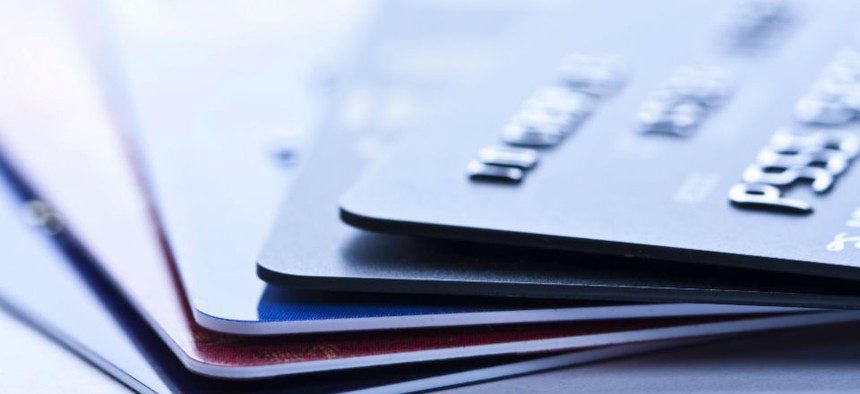
luchunyu/Shutterstock.com
Join a Gym or Get Your Hair Done, Sometimes on Uncle Sam’s Plastic
House Members seek improved enforcement of Government Charge Card Abuse Act.
Given the thousands of agency employees who carry purchasing or travel cards, some misuse would seem inevitable.
The most egregious case cited by Rep. John Mica, R-Fla., at a Tuesday hearing involved some $31,000 spent by Coast Guard employees in fiscal 2013 at a Starbucks in Alameda, Calif. That was followed by details on Job Corps contractors in Miami who in a recent year used travel cards to pay close to $100,000 for trips to the hair salon, clothing and personal phone bills.
At the Environmental Protection Agency, three cardholders purchased gym memberships that required pre-payment for services totaling $2,867, an inspector general testified to the House Oversight and Government Reform Committee. The hearing featured updates on IG reports released this winter and spring.
“I don’t mean to say its rampant abuse, credit cards gone wild, but it’s significant abuse,” said Government Operations Subcommittee Chairman Mica. He was joined by ranking member Rep. Gerry Connolly, D-Va., on Tuesday in writing to the Government Accountability Office to request that it evaluate agency compliance with the 2012 Government Charge Card Abuse Prevention Act.
In introducing the hearing, Connolly stressed a bipartisan interest in curbing waste and abuse. But he cautioned that the abuses should be viewed in context. “It is vital that we not overreact in response to outrageous, yet isolated, incidents of abuse, with broad, one-size-fits-all restrictions that revert our federal procurement system back to a pre-1998 era, which featured higher administrative burdens and more cumbersome bureaucracy that resulted from agencies being unable to utilize government charge cards as a low-cost method to streamline acquisition processes,” he said.
The witnesses from EPA, Homeland Security, the Labor Department and the Air Force largely agreed, and credited their agencies with some progress toward better training and standardization of compliance standards.
Administered by the General Services Administration, the Government Purchase Card program gives agencies—except for the Defense Department, which has a separate program—localized flexibility for “micropurchases” capped at $3,000. The cards save money on transaction processing, ease auditing and, in some cases, earn rebates for the government.
Homeland Security, among the largest purchasers, in fiscal 2013 authorized 9,700 employees to use purchase cards for 925 million purchases valued at about $439 million, according to Anne Richards, assistant inspector general for audits. “Consistent application of controls and vigilant management oversight minimizes fraudulent, improper, abusive or questionable purchase card usage, but the inherent risks cannot be eliminated,” she said.
Nor can poor following of procedures. At EPA, 75 of 80 of transactions (94 percent) recently reviewed were not in compliance with EPA policies, of which $79,254 was identified as prohibited, improper and erroneous purchases, testified Janet Kasper, director of the IG’s Contracts and Assistance Agreement Audits.
At Labor—which Mica praised for getting an early handle on the problem—assistant inspector general for audits Elliot Lewis estimated that Job Corps center contractors racked up $4.2 million in “questionable travel costs” from July 1, 2011, through Sept. 30, 2012. “This mismanagement of Job Corps student travel costs occurred because Job Corps did not regularly review or monitor government travel card expenses to ensure expenses were prudent and allowable in accordance with the Federal Travel Regulation and departmental policy,” he said. “Instead, Job Corps placed reliance on the centers to verify the reasonableness and allowability of their own expenses.”
The agency considered a model for proper monitoring of purchasing cards, Mica said, is the Air Force, whose compliance tools were described on Tuesday by two officials. “The Air Force leveraged use of the card during fiscal 2013 executing nearly 1.5 million transactions for a total expenditure of approximately $1.2 billion,” Deputy Assistant Secretary for Contracting John Lyle said. “Used in place of a written purchase order, these actions returned $14.7 million in rebates to Air Force wings, units and organizations worldwide, and created an estimated $105 million in administrative savings.”
Lyle pronounced himself willing to consider any potential benefits to the Air Force from the coming audits by the civilian agencies on how to improve compliance.
In the end, Connolly said, “We need an explicit prohibition on misuse of credit cards” so that no one thinks there is any kind of government purpose served by using such cards to visit the hair salon.
(Image via luchunyu / Shutterstock.com)
NEXT STORY: Play of the Day: The Cost of Midterm Madness







